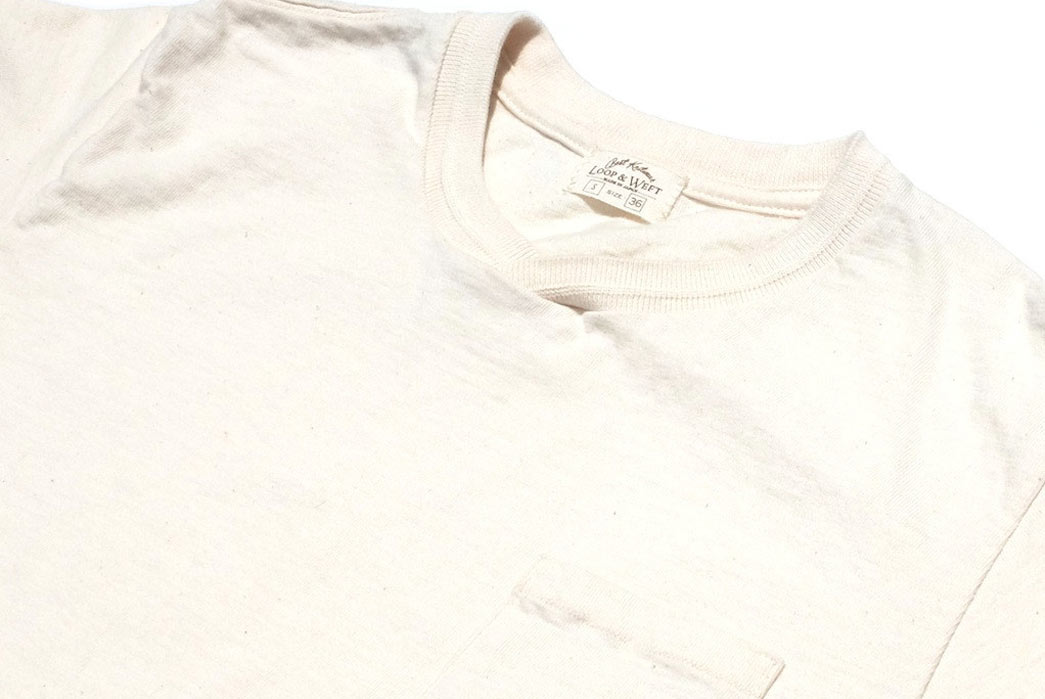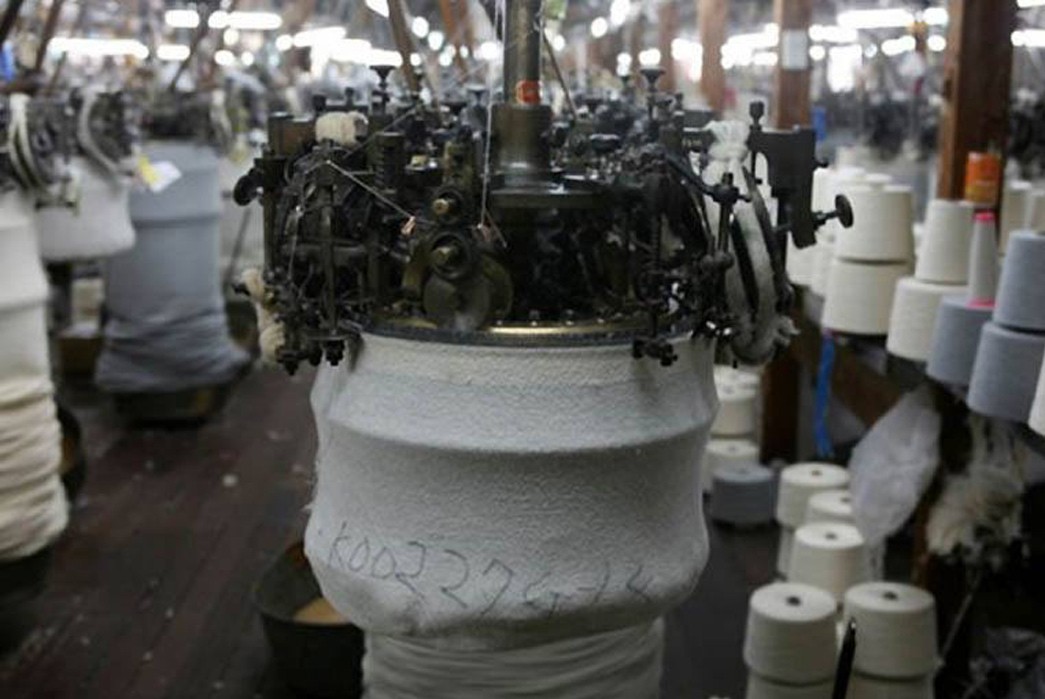- Heddels
- Posts
- Nov 18 - Loopwheel Cotton - Bezel
Nov 18 - Loopwheel Cotton - Bezel
Together with
How To Recognize Loopwheeled Products – The “Selvedge” of Knitwear
Kevin Steinberger

If you’re into heritage wear or vintage clothing, loopwheel is a term you likely know well. In the mid 1920s, sweatshirt fabric was knit on loopwheel machines, a circular tube-knitter.
A loopwheel machine knits the fabric as a continuous circle of material very slowly in an almost tensionless process that ensures that the yarn keeps its inherent natural properties without being stretched. Today, only a few loopwheel machines remain in operation in small factories in Japan, Canada, and Germany.
Why Loopwheel?
The demand for loopwheel products comes down to the history, rarity, and nuance of loopwheel knitting machines. Loopwheel machines work at a painstakingly slow pace, and as speedier tube knit operations were invented, the loopwheelers began to disappear in the 1940s and 50s. Today, most sweatshirt makers work with Sinker circular knitting machines, which can be 30 times as fast as a loopwheel machine. Sinkers are also cheaper to buy and to run, they’re more versatile, less labor intensive, and much easier to maintain.

Close ups of Whitesville loopwheeled cotton fleece via Redcast Heritage.
Now, no need to become obsessed with loopwheeled sweatshirts (or t-shirts, sweatpants, etc.). Though they tend to be of higher quality than the average non-loopwheeled sweatshirt, a non-loopwheeled product made from high-quality cotton on modern machines could technically be better than sweatshirts made from poor-quality cotton on a loopwheel machine.
However, if you want vintage aesthetic and heirloom quality, it’s pretty hard to match a Japanese-made sweatshirt crafted from loopwheeled fabric. These fabrics are reproductions of qualities from a time when folks had one or two sweatshirts made to last. A time before mass production when clothes were generally made for a purpose.
/ Together with Bezel /
Is your dream watch a svelte Patek Philippe, a big honkin’ Panerai, or something somewhere in between?
No matter what you’re looking for, you can find it on Bezel, the world’s top-rated marketplace for buying and selling luxury watches. Download their app to browse their listings of tens of thousands of the most collectible timepieces from the world’s top professional sellers.
And even if you don’t see your grail, Bezel’s concierge team can source nearly anything from their extensive network and authenticate it in-house.
Find your next watch on Bezel.
What Products Can Be Loopwheeled?

Loopwheel t-shirts from Japanese brand Loop & Weft.
Basically anything made from a knit fleece or jersey can be manufactured from loopwheeled cotton:
T-shirts (short and long-sleeved)
Henley shirts
Tanktops
Sweatshirts
Hooded sweatshirts
Sweatpants
Sweaters
How Do You Recognize Loopwheeled Fabric?

Some people will tell you that if a product doesn’t have side seams then it is loopwheeled, which is not true. As explained earlier, today’s circular knitting machines can build nearly any knit garment without side seams, so that’s not always a clear indicator. And makers will often cut apart loopwheeled fabric and stitch it back together to achieve a different, less tubular, fit. Cutting and sewing does not lose the quality or characteristics of loopwheeled cotton.
There are not visual details to help you immediately identify loopwheeled fabric. When knit from a high-quality cotton, they are often plump to the touch and have a slightly irregular weave. Think slubbby denim but it’s cotton fleece. The more loopwheeled items you’ll have touched, the easier it will be for you to recognize it at first glance. If you don’t live in an area with a lot of loopwheeled stuff accessible, you won’t be able to know what it’s like, so here are a few tricks:
Product Line – Brands will be keen to communicate that a product is made from loopwheeled cotton. Some brands that specialize in loopwheeled cotton goods are:
A Lack of Side Seams – Some manufacturers will construct the body of a garment leaving loopwheeled cotton in its tubular state. This is common on t-shirts made from loopwheeled cotton.
Price Point – Loopwheeled products tend to be about twice as expensive as their non-loopwheeled counterparts.
Ask the brand or retailer – If not communicated clearly in the product name or description, this is your best weapon.
Some of The Best Loopwheeled Products Around
Sweatshirts & Hoodies
The Real McCoy’s
The Real McCoy’s 10 oz. Loopwheel Parka, available for $255 from Clutch Cafe.
The Rite Stuff
The Rite Stuff Titan Afterhood Loopwheel Sweatshirt, available for $189 from The Rite Stuff.
Iron Heart
Iron Heart 14 oz. Ultra Heavyweight Loopwheel Cotton Hoodie, available for $310 from Iron Shop Provisions.
Allevol
Allevol Loopwheel Easy Sweatshirt, available for $190 from Clutch Cafe.
Cushman
Cushman Lot. 26901 Set In Sleeve Sweatshirt, available for $215 at Clutch Cafe.
Buzz Rickson’s
Buzz Rickson’s BR65622 Set-In Sleeve Sweatshirt, available for $150 from Franklin & Poe.
Merz B. Schwanen
Merz B. Schwanen 382 Loopwheeled 12oz Classic Fit Hoodie, made in Germany and available for $196 at Redcast Heritage.
Sweatpants
The Real McCoy’s
The Real McCoy’s 10 oz. Loopwheel Sweatpants, available for $290 from Clutch Cafe.
Tees
Whitesville

Whitesville 2-Pack Tees, often sold out due to immense popularity but available at:
Redcast Heritage $77
HINOYA $52
Second Sunrise $72
Self Edge $95
The Rite Stuff
The Rite Stuff Heavyweight 9 oz. Loopwheeled T-Shirts, available for $84 from The Rite Stuff.
The Flat Head
The Flat Head Loopwheel T-Shirts and Henleys, available at Corlection from $92
Samurai Jeans

Samurai Jeans Loopwheel Cotton 2-Pack Tees, available at Brooklyn Clothing for $113.
Iron Heart UTILITEES
UTILITEES 5.5 oz. Loopwheel T-Shirts, made in Japan and available for $75 from Division Road.
Iron Heart (Mainline)
Iron Heart 7.5 oz. Printed (left) and 6.5 oz. Loopwheeled cotton T-shirts, Made in Japan and available for $100 from Iron Heart.
What did you think of today's newsletter? |













